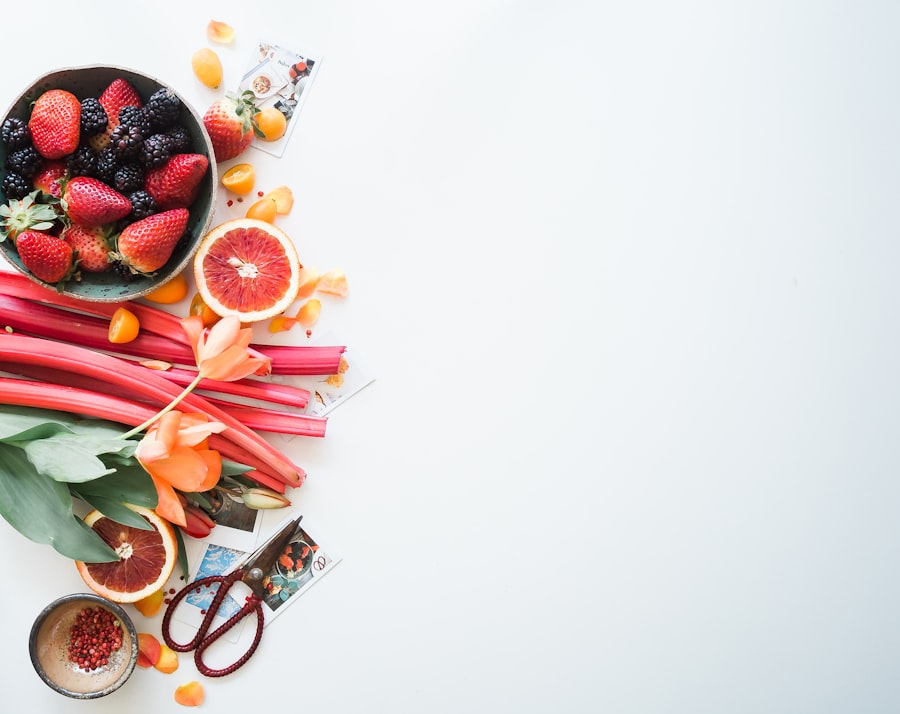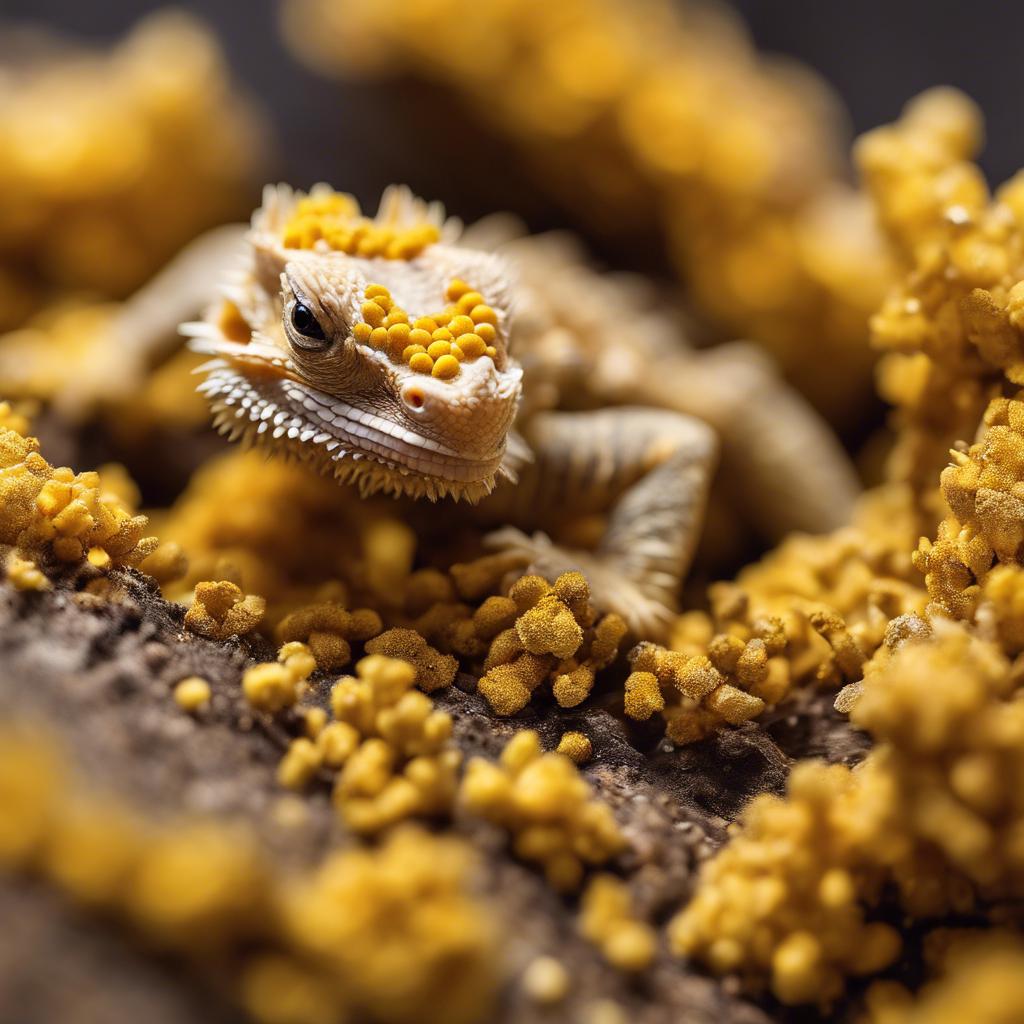Bee pollen is a natural substance that is collected by bees from flowering plants. It is often referred to as a “superfood” due to its high nutritional content. Bearded dragons, which are popular pet reptiles, can benefit from the addition of bee pollen to their diets. A balanced diet is crucial for the overall health and well-being of bearded dragons, and bee pollen can provide them with essential nutrients.
Bearded dragons require a varied diet that includes a mix of vegetables, fruits, insects, and other protein sources. This ensures that they receive all the necessary vitamins, minerals, and proteins they need to thrive. Bee pollen can be a valuable addition to their diet as it is rich in protein, vitamins, minerals, antioxidants, and anti-inflammatory properties.
Key Takeaways
- Bee pollen is a nutritious supplement that can benefit bearded dragons.
- Proper storage of bee pollen is important to maintain its nutritional value.
- Bearded dragons should only be fed small amounts of bee pollen as part of a balanced diet.
- Feeding too much bee pollen can lead to health risks for bearded dragons.
- Bee pollen can be incorporated into bearded dragon diets through mixing with other foods.
Nutritional Benefits of Bee Pollen for Bearded Dragons
One of the main benefits of bee pollen for bearded dragons is its high protein content. Protein is essential for growth, development, and maintenance of tissues in reptiles. It helps support muscle growth and repair, as well as the production of enzymes and hormones. Bee pollen contains all the essential amino acids that bearded dragons need for optimal health.
In addition to protein, bee pollen is also rich in vitamins and minerals. It contains vitamins A, B complex, C, D, and E, as well as minerals such as calcium, magnesium, potassium, and zinc. These nutrients are important for various bodily functions including immune system support, bone health, and proper organ function.
Furthermore, bee pollen contains antioxidants and anti-inflammatory properties. Antioxidants help protect the body against free radicals, which can cause damage to cells and tissues. Anti-inflammatory properties can help reduce inflammation in the body and promote overall health.
How to Properly Store Bee Pollen for Bearded Dragons
Proper storage of bee pollen is important to maintain its freshness and nutritional value. Bee pollen should be stored in a cool, dry place away from direct sunlight. Exposure to heat, moisture, and light can degrade the quality of bee pollen and reduce its nutritional content.
To keep bee pollen fresh, it is recommended to store it in an airtight container. This helps prevent moisture and air from entering the container and causing the bee pollen to spoil. It is also important to avoid storing bee pollen near strong-smelling substances, as it can absorb odors easily.
How Much Bee Pollen to Feed Bearded Dragons
The amount of bee pollen to feed bearded dragons depends on their size, age, and overall health. As a general guideline, it is recommended to start with a small amount of bee pollen and gradually increase the quantity over time. This allows the bearded dragon's digestive system to adjust to the new food.
A good starting point is to offer a pinch of bee pollen once or twice a week. Monitor your bearded dragon's response and adjust the amount accordingly. It is important not to overfeed bee pollen as it can lead to digestive issues.
When determining how much bee pollen to feed, it is also important to consider other factors such as the bearded dragon's diet, activity level, and any underlying health conditions. Consulting with a veterinarian who specializes in reptile care can provide valuable guidance on the appropriate amount of bee pollen for your specific bearded dragon.
Potential Risks of Feeding Bee Pollen to Bearded Dragons
While bee pollen can provide numerous benefits for bearded dragons, there are also potential risks associated with its consumption. One of the main risks is allergic reactions. Some bearded dragons may have allergies or sensitivities to certain substances in bee pollen. It is important to monitor your bearded dragon closely after introducing bee pollen into their diet and watch for any signs of allergic reactions such as swelling, itching, or difficulty breathing. If any of these symptoms occur, discontinue the use of bee pollen and consult with a veterinarian.
Another potential risk is contamination with pesticides or other harmful substances. It is crucial to source high-quality bee pollen from reputable suppliers who follow strict quality control measures. Organic bee pollen is generally considered safer as it is produced without the use of synthetic chemicals.
Best Ways to Incorporate Bee Pollen into Bearded Dragon Diets

There are several ways to incorporate bee pollen into a bearded dragon's diet. One option is to mix a small amount of bee pollen with other foods such as vegetables or fruits. This can provide a nutritional boost to their regular meals. Another option is to sprinkle bee pollen on top of their food as a garnish. This can add flavor and visual appeal to their meals.
For those who enjoy DIY projects, making bee pollen treats for bearded dragons can be a fun and creative way to incorporate this superfood into their diet. There are numerous recipes available online that use bee pollen as an ingredient in homemade treats specifically designed for reptiles.
Bearded Dragon Care: Importance of a Balanced Diet
A balanced diet is crucial for the overall health and well-being of bearded dragons. In addition to bee pollen, there are several other foods that should be included in their diet. Vegetables and fruits should make up a significant portion of their meals, providing essential vitamins, minerals, and fiber.
Leafy greens such as kale, collard greens, and dandelion greens are excellent choices for bearded dragons. They are rich in calcium, which is important for bone health. Fruits such as berries, melons, and apples can be offered as occasional treats due to their higher sugar content.
Insects and other protein sources should also be included in a bearded dragon's diet. Crickets, mealworms, and dubia roaches are commonly fed to bearded dragons as they are rich in protein. It is important to gut-load these insects with nutritious foods before feeding them to the bearded dragon, as this enhances their nutritional value.
Calcium supplements are also recommended for bearded dragons to ensure they receive adequate amounts of this essential mineral. Calcium is important for bone health and proper muscle function. It can be provided in the form of calcium powder, which can be dusted onto their food.
Other Foods That Complement Bee Pollen in Bearded Dragon Diets
In addition to bee pollen, there are several other foods that can complement a bearded dragon's diet. Vegetables such as carrots, bell peppers, and squash can provide additional vitamins and minerals. Fruits such as papaya, mango, and figs can be offered as occasional treats.
Insects such as black soldier fly larvae and silkworms can be included in their diet to provide variety and additional protein. These insects are also high in calcium, making them a nutritious choice for bearded dragons.
It is important to note that while these foods can complement a bearded dragon's diet, they should not replace the staple foods such as vegetables and insects. A balanced diet that includes a variety of foods is key to ensuring that bearded dragons receive all the necessary nutrients for optimal health.
How to Recognize Signs of Nutritional Deficiencies in Bearded Dragons
It is important to monitor your bearded dragon for signs of nutritional deficiencies. Common signs include weight loss, lethargy, poor appetite, soft or deformed bones, and changes in skin color or texture. If you notice any of these symptoms, it is important to consult with a veterinarian who specializes in reptile care.
Regular check-ups with a veterinarian are also important for the overall health and well-being of bearded dragons. A veterinarian can assess their diet and make recommendations based on their individual needs. They can also perform blood tests to check for any underlying health conditions or nutritional deficiencies.
Is Bee Pollen a Good Choice for Your Bearded Dragon?
In conclusion, bee pollen can be a valuable addition to a bearded dragon's diet due to its high nutritional content. It is rich in protein, vitamins, minerals, antioxidants, and anti-inflammatory properties. However, it is important to consider the individual needs of your bearded dragon and consult with a veterinarian before making any dietary changes.
While bee pollen can provide numerous benefits, there are also potential risks associated with its consumption. Allergic reactions and contamination with pesticides or other harmful substances are possible risks. It is crucial to source high-quality bee pollen from reputable suppliers and monitor your bearded dragon closely after introducing it into their diet.
A balanced diet that includes a variety of foods is essential for the overall health and well-being of bearded dragons. In addition to bee pollen, vegetables, fruits, insects, and calcium supplements should be included in their diet. Regular check-ups with a veterinarian are important to ensure that they receive all the necessary nutrients and to monitor for any signs of nutritional deficiencies.
If you're wondering whether bee pollen is good for bearded dragons, you may also be interested in learning about other foods that are safe for them. One such article on Reptile Wizard discusses whether bearded dragons can eat black beans. To find out more about this topic, you can check out the article here.
FAQs
What is bee pollen?
Bee pollen is a mixture of flower pollen, nectar, enzymes, honey, wax, and bee secretions. It is collected by bees and used as a food source for the hive.
Can bearded dragons eat bee pollen?
Yes, bearded dragons can eat bee pollen. However, it should only be given in small amounts as a treat and not as a staple food.
What are the benefits of bee pollen for bearded dragons?
Bee pollen is rich in protein, vitamins, minerals, and antioxidants, which can help boost the immune system and improve overall health in bearded dragons.
Are there any risks associated with feeding bee pollen to bearded dragons?
Yes, there are some risks associated with feeding bee pollen to bearded dragons. It can cause allergic reactions in some individuals, and it may also contain pesticides or other harmful substances if not sourced from a reputable supplier.
How should bee pollen be fed to bearded dragons?
Bee pollen should be fed to bearded dragons in small amounts as a treat, mixed in with their regular food. It should not be given as a substitute for their regular diet.

